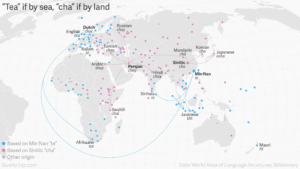Language is the door to culture’

The National Education Federation (FNE) is warning of a decline in the Portuguese language education abroad. We are therefore going to discuss Portuguese mini-expressions with only one consonant and the letter ‘a‘.
We’ll travel in alphabetical order; courtesy of Marco Neves.

Bá Just like that doesn’t exist in the Portuguese language.
In Angola, the dictionary tells us that bá means < amazement or encouragement >
Cá Means < here > For example: I’ am here ( Estou cá).
Dá < Give (it to me) > From the verb dar ( to give).

Fá Is the name of a music note.
Gá To keep the syllable with the ‘a’ and get a word with meaning, you would have to double it: gagá meaning < weakened, aged >
In Guine-Bissau gã with tilde means < family >
Há Means < there is > From the verb Haver. In French < Il y a >
For example: There is bread today ( Há pão hoje).

Já < Already or right now > For example: I’ am coming ( Vou já).
Lá < There > For example: There it is ( Lá esta).
Má < Bad > For example: You are bad ( És má).
Ná The quick saying of < no > especially in the south of the country.
For example: Don’t say that ( Ná digas isso).

Pá < Shovel > Also a common popular saying.
For example: Hey man, do you have a cigarette? ( Ó pá, tens um cigarro?) or
Hey man, give me a hug ( Ó pá, dá um abraço).
Rã < Frog >
Sá < Healthy > Also a solid surname. For example: Pedro Gomes de Sá.

‘Tá < Okay > With the apostrophe it is the abbreviation of the word está from the verb estar, that means to be.
For example: Is everything all right (‘Ta tudo bem?).
Vá < Go! > From the irregular verb ir (to go).
Xá < Shah > Indeed, the one from Persia. From xáh (king) in Persian.
In northern Mozambique xá means < Oh! > (surprise or admiration).
-> Ká – Qá – Wá and Zá have no meaning in the Portuguese language.
Enjoy the week Boa semana













 There are roughly two ways to say tea in the world. One is like the English expression – thee in Dutch, tee in German or thé in French. The other is a variation of cha – chay in Russian, chai in Swahili or shay in Arabic. Both variations come from China. The words that sound like cha spread across the land, the tea saying spread over water.
There are roughly two ways to say tea in the world. One is like the English expression – thee in Dutch, tee in German or thé in French. The other is a variation of cha – chay in Russian, chai in Swahili or shay in Arabic. Both variations come from China. The words that sound like cha spread across the land, the tea saying spread over water. But the Chinese character for cha is pronounced as te in the Min Nan variety of Chinese, spoken in the coastal province of Fujian.
But the Chinese character for cha is pronounced as te in the Min Nan variety of Chinese, spoken in the coastal province of Fujian. Although it’s fairly commonly known that tea originated in China, it is far less known that it was a particular Portuguese woman, who inspired its popularity in England. Let’s go back to 1662, when
Although it’s fairly commonly known that tea originated in China, it is far less known that it was a particular Portuguese woman, who inspired its popularity in England. Let’s go back to 1662, when